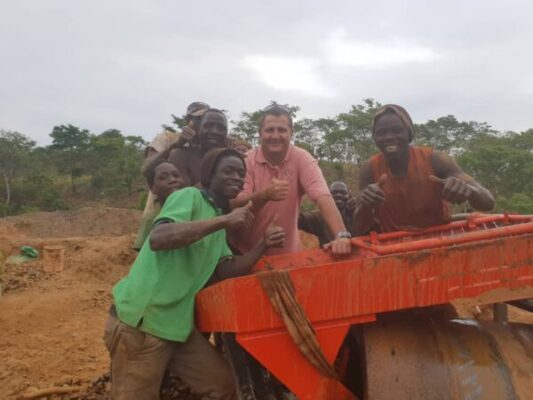Indigenous mining equipment suppliers, miners call for government protection

A proudly Zimbabwean machine engineering, steel fabrication, mining, farming, and lifting equipment company, Yagden Engineering has called on the government to support local mining equipment manufacturers and suppliers as this will reduce externalisation of funds as well as smuggling and the creation of employment.
Speaking to Mining Zimbabwe at a site visit by Mines and Mining Development Portfolio Committee Chairperson Hon Edmond Mkaratigwa on a fact-finding mission on challenges local equipment suppliers are facing, Yagden Director, Mr Wayne “Mukwasha” Williams said the government should protect mining equipment suppliers, as well as miners from cheap and substandard and reject equipment which is dumped on the country.
“There are equipment suppliers who have flooded the market with cheap and substandard mining equipment thereby prejudicing miners of the real value to their investment.
“Many small-scale and artisanal miners in the country are buying this cheap equipment which becomes absolute three months down the line,” Wayne said.
According to Kudakwashe Mbondiya (2016) sited by Torque Mude (2016), the Changfa generators and mining compressors (Chinese products) are not reliable because they are not strong and always need to be rested at regular intervals when using them.
He also expressed disdain for Changfa generator which he says requires a lot of water for cooling when started.
Due to this, Wayne called for the government to address the uncertainty caused by substandard equipment in the sector which he said delays work and promotes smuggling of minerals.
The Yagden Director also said that some equipment suppliers are in the habit of lending artisanal miners cheap equipment as a way of getting all the minerals produced by the miners at a very low price.
“All equipment should have serial numbers which are traceable by the government.
“The government should be able to track all the mining equipment in the country so that they know where mining activities are taking place and where the gold is being sold.” He said.
Positive in buying local Buying local keeps money circulating within the local economy. Studies have shown that local businesses recirculate a greater share of every dollar as they create locally owned supply chains and invest in their employees.
Local retailers are believed to return 72 per cent of their revenue into the local economy, compared to just 14 per cent for national chain retailers. Money circulating through the local economy benefits everyone who is a part of each transaction. This, therefore, means that if mining firms buy equipment from local manufacturers, money circulating within the economy will be able to sustain many people.
According to Norton Miners Association Chairperson, Mr Privelage Moyo, the country, because it was not promoting local businesses, transactions happening are benefiting other nations leaving us in abject poverty.
He said that miners in Zimbabwe are working for other countries as what they are digging underground is benefiting the east and western countries because the miners are investing a lot in their equipment“As a country let alone as the mining sector, we are putting all our effort and power in the labour but at the end, our output is benefiting other countries like China. Our minerals go towards their country’s industries to which they dictate the buying price and in turn, they manufacture equipment whose price they peg and engage their Chinese people supported by their banks to come back again to our African countries to trade again the very machines and accessories from our minerals and scoop the revolving foreign currency back to their nations.
“As a country due to ignorance of ministries, we are only surviving on peanuts and crumbs that’s why we cannot afford a budget surplus of foreign currency. We have industries which are ghost houses as there is no support and ministries are not sharing ideas on what’s required so that citizens may take up those tasks.
“Everything world over is advanced from someone’s design by its automobile industry.
In our mining sector equipment and consumable are being imported and being sold by the very manufacturers at our huge expense.
Most of the equipment you will realise that it consumes a big chunk of our earnings through imports yet all the raw materials are available locally and let alone profits from their trade find their way back to their mother countries.
If as a starting point we cut the Chinese in the trade we save a bit for our country’s earnings.” he said.
As long as the government prioritises foreigners first before citizens, it spells doom for our country, citizens are first and should be considered first in all, then complimentary support should come from the country’s friends being “the foreigners”.
Relying on foreign equipment even in the small-scale sector breathes dependence and mediocrity upon the country and it kills innovation.
What miners think the government should do
Moyo said it was of greater importance for Ministries to start working together to curb the prejudice brought by shameless businesses from other countries who are dumping their cheap equipment on the country.
“This is why we were calling up Ministries to join hands and start working together. They are some advantages of Ministries being independent but, on the ground, regarding production and development, they are outweighed by disadvantages.
“As miners, we feel our line Ministry is being sidelined by other ministries that are allowing and authorising Chinese and other foreign nationals who are manufacturing substandard mining equipment and machinery in their countries to be retailers in our country at the expense of our local business people.” he said.
According to Moyo, Ministries should promote homegrown ideas and products. Hammer Mills and many other products used in the small scale and artisanal mining sector should be produced locally as a way of promoting all small businesses in the country to grow.
“All that the Ministries can do is to expose its staff or institutions to developed countries and learn production modules which adds value to our country.
“We have many informal engineers in Mbare who are trying very hard to come up with the mining industry equipment, machinery and consumable requirements but not even one ministry cares about their growth although they are somehow producing usable equipment from scrap metal and proving to be useful and much better than that of the Chinese,” Moyo said.
What needs to be done?
The first thing the government should do is to convince and make Zimbabweans understand the merits of what is currently produced locally while ensuring citizens that which is produced locally is sustainably produced as per the trending market demands.
The government does not necessarily need to target and discourage foreign-owned companies but should prove to miners that the equipment produced in the country can satisfy the market in all its respects.
The Mines and Mining Development Portfolio Committee and the Ministry of mines should have adequate data and a market-driven plan for establishing startup packages for our small scale and artisanal miners.
The move is achievable through convincing data and optimum business models that can be tested in the country.
The advantage of local manufacturers is that they can be linked up with local financiers without challenges and they can easily give other associated services like empowering training to upcoming businesses as part of the package.
What is the government doing?
According to the Chairperson of the Parliamentary Portfolio on Mines and Mining Development Hon Edmund Mkaratigwa, the government will soon roll out a program that will support equipment suppliers by encouraging miners to buy local.
Mkaratigwa said the government through the Mines Portfolio committee was going to create a pilot project to support its ideas.
“The main plan is to have local suppliers prove themselves to be innovative and complementary to the mainstream government plans and targets and our support is always there.
“YAGDEN for example possesses vast experience and knowledge derived from already tried ideas in the field and that can be brought to the fore for trial in sampled areas for a start at a national level. They need that opportunity because their work is huge and potential can be harnessed for the broader good of their business and the Zimbabwe vision at large.” Hon Mkratigwa said.
What equipment suppliers should do?
According to Mkaratigwa some equipment suppliers should move from being backyard small equipment suppliers to renowned equipment manufacturers and should also be innovative enough to explore the corridors that are being exploited by the Chinese to put a balance in the industry.
“On the other hand, equipment suppliers should consider those who are just starting up, a gap that is currently being exploited by foreign manufacturers. That will enable companies to grow quickly and build up capacities for supplying to large mining firms.
The issue is about building brands and maintaining standards as well as being ambitious.
“They need support but they should find entry-level onto the broader mining market by being innovative and being prepared to cooperate where possible.
The industry needs to come together to discuss and start to build their relevance in the sector. Moving from being backyard small scale manufacturers to renowned names.” He said.
The Mines Portfolio chair also said that the committee stands to support equipment manufacturers because the US$ 12 BILLION mark is achievable through reliable machinery and equipment in line with the adage “the workman is as good as his tools.”
How to curb leakages caused by foreign suppliers?
According to Hon Mkaratigwa, to limit leakages caused by foreign suppliers who lease mining equipment and consumable to artisanal miners to exploit them and loot the resources is by promoting local suppliers of such equipment and encourage artisanal miners to engage them.
“The main way to limit such leakages is promoting local suppliers of such equipment and the whole matter can start from there.” he said.
This article first appeared in Mining Zimbabwe magazine


